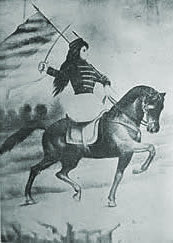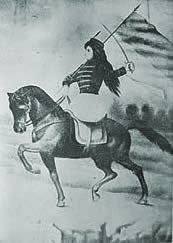
|
Women and Independence in Latin America An exploration of women's involvement in the Latin American Wars of Independence |

|

|
Women and Independence in Latin America An exploration of women's involvement in the Latin American Wars of Independence |

|
Click on the image below to see the full-size image
 Exile 1814 |
Gender:Female
Ethnic origen: Unknown
Events:
| 1810 | - | Bogotá | - | Unknown | - | On 14 August 1810 she insisted that the Viceroy and his wife return safely to their palace. |
| 1816 | - | Facatativá | - | Unknown | - | She and her family were exiled to Facatativá by Morillo in August 1816. |
Connections:
Alvarez family (Bogotá)Biography:
Born in Medellín, she was the daughter of Rafael Ricaurte y Terreros and María Ignacia Mauriz y Posada. Her children were officials Ignacio, Antonio, Manuel, Mariano and Joaquín París. She was aunt of Ignacio, Manuel and Antonio Ricaurte Lozano. (Monsalve, 221)
On 14 August 1810 she was among a group of Bogotá women who insisted that the Viceroy and his wife, Francisca Villanova, be given safe conduct from the prisons in which they'd been held overnight and returned to the Viceroy's palace. (Monsalve, 94)
She married Spaniard, José Martín París who was imprisoned by Morillo in 1816. He died on 12 November (1816?) and was buried in the San Francisco cemetery. Her son, Joaquín París Ricaurte married María de los Dolores Roche Domínguez. (Monsalve, 150, 160)
She was the mother of Ignacia París de Vargas, mother-in-law of José Ignacio Vargas, who was shot by the Spaniards.
She was part of the González Manrique, Alvarez, Ricaurte, París, Pardo, Nariño clan. (Monsalve, 139)
In August 1816 she and her family were exiled to Facatativá by Morillo. She was probably held in the Cárcel Chiquita beforehand. (Monsalve, 157, 159)
On 10 August 1819, after the battle of Boyacá, she and her grand daughter, Dolores Vargas, were among the first to greet Bolívar. He ate at her house that night. (Monsalve, 215)
She was awarded an annual pension of 300 pesos by Bolívar after independence. (Monsalve, 263)
References:
Monsalve, José D (1926) Mujeres de la independencia